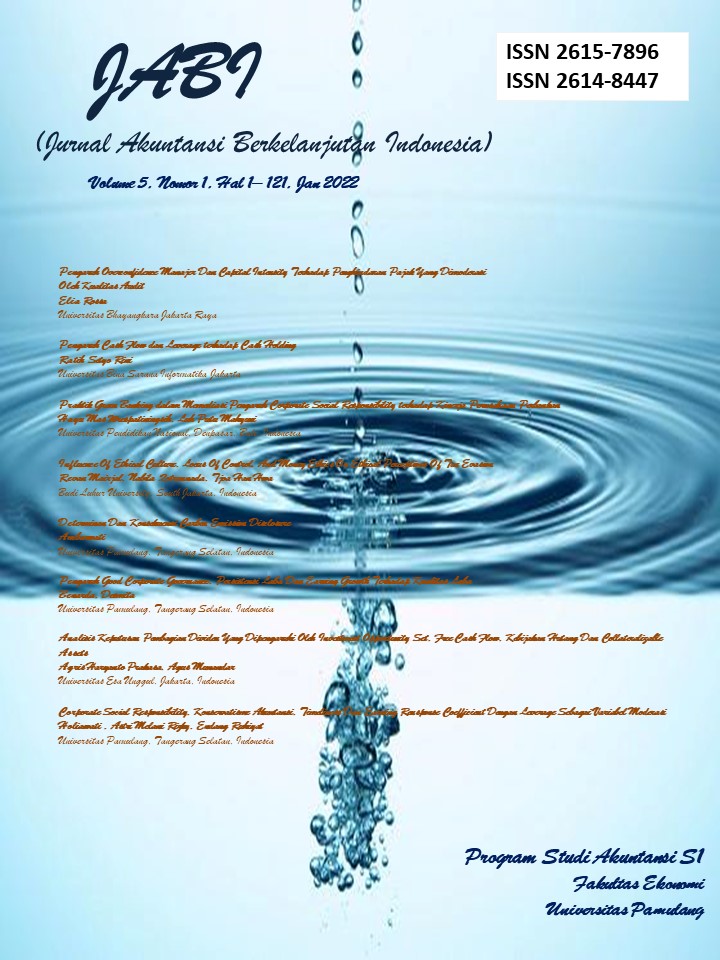Pengaruh Pengetahuan Akuntansi terhadap Penerapan Akuntansi Digital serta Dampaknya terhadap Kinerja UMKM
DOI:
https://doi.org/10.32493/JABI.v5i3.y2022.p243-254Keywords:
Accounting knowledge, Digital accounting, MSME PerformanceAbstract
MSME actors have not been able to fully utilize the use of technology, this is a challenge for MSME actors in Indonesia. This study aims to determine the effect of accounting knowledge of MSME actors on the application of digital accounting and its impact on MSME performance. The type of data in this study is quantitative data with the primary data source from a questionnaire. The population in this study is MSMEs in the Brebes District, Brebes Regency with a sample of 65 MSMEs using a simple random sampling technique. The data analysis technique in this study used the SEM Partial Least Square (PLS) method. The result showed that the level of accounting knowledge has a significant positive effect on the application of digital accounting, the level of accounting knowledge has no effect on performance, and the application of digital accounting has a significant positive effect on performance.
References
Abubakar, A., & Wibowo. (2005). Akuntansi untuk Bisnis Usaha Kecil dan Menengah. PT Grasindo.
Achadiyah, B. N. (2019). Otomatisasi Pencatatan Akuntansi Pada Umkm. Jurnal Akuntansi Multiparadigma, 10(1). https://doi.org/10.18202/jamal.2019.04.10011
Andhika, Y. H., & Damayanti, T. W. (2017). Niat Melakukan Pencatatan Akuntansi pada Usaha Kecil Menengah: Pengetahuan Akuntansi Ataukah Herding? Jurnal Ekonomi Dan Bisnis, 20(2), 331–346.
Aribawa, D. (2016). Pengaruh Literasi Keuangan Terhadap Kinerja dan Keberlangsungan UMKM di Jawa Tengah. Jurnal Siasat Bisnis, 20(1).
Bawono, I. R., Arofah, T., & Ubay, B. M. S. (2020). The Effect of Accounting Information and Internal Characteristics of Entrepreneurs toward SMEs Productivity. Jurnal Ilmiah MEA …, 4(3), 337–356.
Carey, P. (2015). External Accountants’ Business Advice and SME Performance. Pacific Accounting Review, 27(2), 166–188. https://doi.org/https://doi.org/10.1108/PARÂ04Â-2013Â0020
Ermawati, N., & Arumsari, N. R. (2021). Sistem Informasi Akuntansi Pada Kinerja Usaha Kecil Menengah. Jurnal Bisnis Dan Akuntansi, 23(1), 145–156. https://doi.org/10.34208/jba.v23i1.973
Ghozali, I. (2014). Structural Equation Modeling Metode Alternatif dengan Partial Least Square (PLS) Dilengkapi Software Smartpls 3.0. Xlstat 2014 dan WarpPLS 4.0 (4th ed). Badan Penerbit Universitas Diponegoro.
Ghozali, I., & Latan, H. (2015). Partial Least Squares: Konsep, Teknik dan Aplikasi SmartPLS 3.0 untuk Penelitian Empiris. Badan Penerbit Universitas Diponegoro.
Gullkvist, B. (2011). Drivers of Diffusion of Digital Accounting Practices. University of Vaasa.
Hendrawati, E. (2017). Analisis Faktor-Faktor Yang Mempengaruhi Penggunaan Informasi Akuntansi Pada Usaha Mikro, Kecil Dan Menengah (UMKM). Magistra Jurnal Ilmu Manajemen, 1(2).
Hudha, C. (2017). Pengaruh Tingkat Pendidikan, Pengetahuan Akuntansi Dan Pelatihan Akuntansi Terhadap Penggunaan Informasi Akuntansi Dimoderasi Ketidakpastian Lingkungan Usaha Kecil Menengah. Jurnal Ekonomi Pendidikan Dan Kewirausahaan, 5(1), 68. https://doi.org/10.26740/jepk.v5n1.p68-90
Johan, R. (2021). Faktor-Faktor yang Mempengaruhi Penggunaan Iinformasi Akuntansi pada UMKM di Kabupaten Karawang. Jurnal Akuntansi, 14(2), 188–212. https://doi.org/10.25170/jak.v14i2.1599
Lestari, N. A., & Rustiana, S. H. (2019). Pengaruh Persepsi Owner Dan Pengetahuan Akuntansi Dalam Penggunaan Sistem Informasi Akuntansi Terhadap Kinerja Usaha Mikro, Kecil, Dan Menengah Di Pamulang. Journal of Business and Entrepreneurship, 1(2), 67–80. jurnal.umj.ac.id/index.php/baskara
Miftah, M., & Febri Sukmawati. (2020). Digitalisasi Akuntansi Pengelolaan Keuangan Dengan Metode Accrual Basis Pada Klinik As Shifa Kendal. Kompak :Jurnal Ilmiah Komputerisasi Akuntansi, 13(1), 47–62. https://doi.org/10.51903/kompak.v13i1.156
Nainggolan, E. (2020). UMKM Bangkit, Ekonomi Indonesia Terungkit. Djkn.Kemenkeu.Go.Id. https://www.djkn.kemenkeu.go.id/artikel/baca/13317/UMKM-Bangkit-Ekonomi-Indonesia-Terungkit.html
Priliandani, N. M. I., Pradnyanitasari, P. D., & Kurniawan, K. A. (2020). Pengaruh Persepsi dan Pengetahuan Akuntansi Pelaku Usaha Mikro Kecil dan Menengah Terhadap Penggunaan Informasi Akuntansi. Jurnal Akuntansi, Ekonomi Dan Manajemen Bisnis, 8(1), 67–73.
Rini, F., & Firman, S. (2018). Pengaruh Tingkat Pendidikan dan Penggunaan Informasi Akuntansi Manajemen Terhadap Kinerja UMKM di Kota Padang. Jurnal Akuntansi Dan Manajemen, 13(1), 93–111. https://doi.org/10.30630/jam.v13i1.33
Sarwono, J., & Narimawati, U. (2015). Membuat Skripsi, Tesis, dan Disertasi dengan Partial Least Square SEM (PLS-SEM). Penerbit ANDI.
Sekaran, U., & Bougie, R. (2017). Metode Penelitian untuk Bisnis (6th ed). Salemba Empat.
Sholihin, S., & Ratmono, D. (2013). Analisis SEM-PLS dengan WarpPLS 3.0. CV Andi Offset.
Sinarwati, N. K. (2017). Sistem Informasi Akuntansi Berbasis Mobile bagi UMKM. Seminar Nasional Riset Inovatif 2017, 44–49.
Sinarwati, N. K., Sujana, E., & Herawati, N. T. (2019). Peran Sistem Informasi Akuntansi Berbasis Mobile Bagi Peningkatan Kinerja Umkm. License Jurnal KRISNA: Kumpulan Riset Akuntansi, 11(1), 26–32.
Sitorus, S. D. H. (2017). Pengaruh Latar Belakang Pendidikan dan Pengetahuan Tentang Akuntansi Terhadap Penggunaan Sistem Informasi Akuntansi Pada Pedagang di Wilayah Kelurahan Helvetia Tengah Medan. At-Tawassuth, 2(2), 413–436.
Wahyuni, T., Marsdenia, M., & Soenarto, I. (2018). Analisis Pengaruh Penerapan Sistem Informasi Akuntansi Terhadap Pengukuran Kinerja UMKM di Wilayah Depok. Jurnal Vokasi Indonesia, 4(2). https://doi.org/10.7454/jvi.v4i2.97
Wardi, J., Putri, G. E., & Liviawati. (2020). Pentingnya Penerapan Pengelolaan Keuangan Bagi UMKM. Jurnal Ilmiah Ekonomi Dan Bisnis, 17(1), 62. https://journal.unilak.ac.id/index.php/JIEB/article/view/3250/2036
Zaenal, A. (2012). UMKM Sebagai Tulang Punggung Perekonomian Nasional. Alfabeta.
Downloads
Published
Issue
Section
License
Copyright (c) 2023 Aryanto Aryanto, Fitri Amaliyah

This work is licensed under a Creative Commons Attribution 4.0 International License.
Authors who publish with this journal agree to the following terms:
- Authors retain copyright and grant the journal right of first publication with the work simultaneously licensed under a Creative Commons Attribution License that allows others to share the work with an acknowledgement of the work's authorship and initial publication in this journal.
- Authors are able to enter into separate, additional contractual arrangements for the non-exclusive distribution of the journal's published version of the work (e.g., post it to an institutional repository or publish it in a book), with an acknowledgement of its initial publication in this journal.
- Authors are permitted and encouraged to post their work online (e.g., in institutional repositories or on their website) prior to and during the submission process, as it can lead to productive exchanges, as well as earlier and greater citation of published work (See The Effect of Open Access)

This work is licensed under a Creative Commons Attribution-ShareAlike 4.0 International License.


 PUBLICATION ETHICS
PUBLICATION ETHICS FOCUS AND SCOPE
FOCUS AND SCOPE EDITORIAL TEAM
EDITORIAL TEAM REVIEW PROCESS
REVIEW PROCESS CONTACT US
CONTACT US AUTHOR GUIDELINES
AUTHOR GUIDELINES




